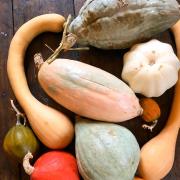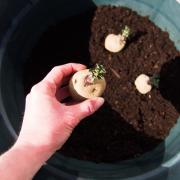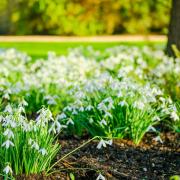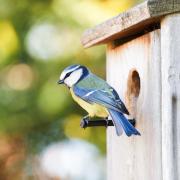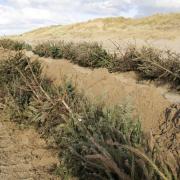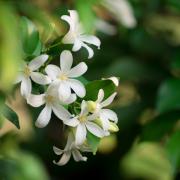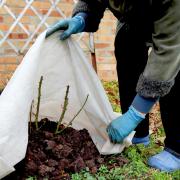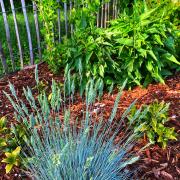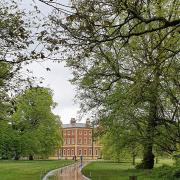These hidden oases around Lancaster offer sanctuary away from the noise and bustle of the city
Don’t tell anyone, but secret gardens are growing popular in Lancaster. Three peaceful oases are hidden behind the city’s oldest town house, at the back of a creative industries centre, and in the midst of a former quarry.
Probably the oldest of these secret gardens belongs to what is now the Judges’ Lodgings Museum, built around 1625. Originally a functional space, probably where horses were stabled, an excavation revealed some Roman archaeology there.

After becoming overgrown when the building closed for three years, the Judges’ Lodgings garden became a hive of activity again when the museum re-opened in 2019.
Volunteers, led by site manager Jenny Dowell, cleared the rampant brambles and weeds before planting bulbs and bedding plants to bring the garden back to life and were highly commended for their efforts in the national Marsh Volunteering Awards.
‘They did an amazing job,’ said Jenny.

If lockdown restrictions are lifted by the summer, the garden could host events and development plans have been drawn up by landscape architect and former Judges Lodgings Friends chair, David Redmore.
‘The plan is for a strict geometric design to include a parterre based on a bookcase in the museum and featuring plants particular to the Georgian period,’ David said.
The design, including much wider stone paths for disabled access, an area for outdoor classrooms and to enjoy afternoon teas and events, is dependent on funding.
Just a stone’s throw from the Judges Lodgings - at The Storey - is another of Lancaster’s secret gardens.

These large walled gardens originally belonged to a Georgian house in Castle Park owned by the slave trading Satterthwaite family and during World War Two contained a Dig for Victory plot.
In the 80s, the gardens were transferred to Lancaster City Council and became overgrown and inaccessible until in 1998, internationally renowned conceptual artist, Mark Dion created The Tasting Garden there.
Local people laid paths, planted fruit trees, built a folly and installed plinths bearing bronze fruit sculptures.
And thanks to the efforts of volunteers, residents and the council, the gardens continued to be maintained and developed until closing to the public in 2006 during refurbishment of The Storey.

Unfortunately, during this time, most of the sculptures were stolen and the plinths damaged, and when the Storey re-opened, the gardens remained closed.
Now, the Friends of the Storey Gardens, formed in 2013, work with the council to restore and maintain the gardens which re-opened to the public in 2018 following access improvements.
READ MORE: Saving the terraced gardens at Rivington
READ MORE: 6 things to look out for when you visit RHS Bridgewater
An important part of the Friends work is making the gardens a wildlife haven and raising awareness of their history and location.
Friends secretary, Ruth Standring-Cox, thinks the variety of environments within the gardens make them so special. ‘I love the paths laid out like the branches of a tree and the folly is an interesting place. There’s also the beautiful flower beds, the spring bulbs and all the plants which change with the seasons.’
Many visitors find the gardens accidentally after visiting Lancaster Castle nearby and to office workers and The Storey’s tenants, it’s a quiet space to enjoy a break.
In normal times, the Friends’ work sessions take place monthly but from March to August last year, lockdown prevented them, so much of the garden was overgrown when volunteers returned.
Future plans include acquiring enough funding to restore The Tasting Garden to its former glory and providing lectures and horticultural activities.
But it’s not just Lancaster’s grand buildings which can boast secret gardens, community gardens such as those behind Barton Road Centre in Scotforth and at Aldcliffe Road Triangle near the canal, are also tucked away from the hustle and bustle.
And in a former quarry nestled among terraced houses is one which celebrates its tenth anniversary this year.

First established by Transition City’s food group, Scotch Quarry Community Garden became an independent project in 2015, encouraging local residents, mostly living in houses without gardens, to engage with nature and learn about growing food.
The garden now includes a woodland, wildflower meadow and raised beds filled with fruit and herbs which visitors are encouraged to pick, including some more unusual varieties suggested by residents originally from other countries.
While lockdown has meant monthly sessions at Scotch Quarry were cancelled, being fairly low maintenance was an advantage.

‘The garden has looked after itself beautifully,’ said chair, Beccy Whittle. ‘During lockdown last spring we had nice feedback from people who said seeing the garden had been a lifeline for them.’
*In normal times, the Judges’ Lodgings Museum is open March-November, Friday-Sunday, 11am-4pm; the Storey Gardens: March-October Monday-Saturday, 10am-4pm; November-February 10am-3pm and Scotch Quarry is open all year round.



